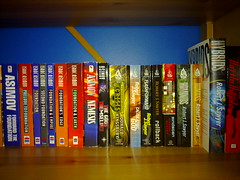On seeing my sci-fi book collection (of which you can see but a tiny part to the right) a friend asked me what were my favourite books. While it’s a little like asking a parent who is his/her favourite son, I do have some sci-fi books I’ve reread more than others.
- The Gods Themselves, Isaac Asimov: Parallell universes, love and the laws of physics, what’s not to like?
- The Mars Trilogy, Kim Stanley Robinson: The 200-year history of the colonization of Mars from arrival of the first settlers to terraformation. Heavy on ecological, economic and sociological themes.
- Flashforward, Robert J. Sawyer: Instead of destroying life, the universe and everything, the LHC shows the whole population of earth their selves 20 years in the future. Now becoming a TV series.
- The Hitchhiker’s Guide to the Galaxy (a trilogy in five parts), Douglas Adams: Spaceships, aliens and Englishmen were never so funny.
- Spares, Michael Marshall Smith: A bleak, totally dystopian future where clones are raised to replace the body parts of the rich.
- The Postman, David Brin: One of the biggest cinematic flops by Kevin Costner is based on a very solid post-apocalyptic novel, with survivalism as a cancer of society and the difference of science and magic being the main themes of the novel.
- The Forever War, Joe Haldeman: War against aliens on relativistic spaceships means in Earth a 1000 years pass, while our main character ages less than a year. A stinging commentary on the Vietnam War.
- Space Odyssey, Arthur C. Clarke: An absolute classic. You might have probably seen the first movie, but that’s not the end of it.
- Foundation Series, Isaac Asimov: Another classic. The Galactic Empire is falling, and a man has foreseen it aided by the scientific approach he has created. He cannot stop it, but he can try to alleviate it. Eventually these books were merged with others written by Asimov, charting a fictitious human history spanning 25,000 years.
- Dune Series, Frank Herbert: Last classic series I’ll write about here. 15,000 years of human history. Rebellions against robot overlords, political intrigue and a big exploration of the nature of religion.
- The Man in the High Castle, Phillip K. Dick: The Nazis and the Japanese Empire won World War II. The US doesn’t exist anymore, but the former axis plot against each other.
- The Years of Rice and Salt, Kim Stanley Robinson: The black death exterminates the population of Europe, and we follow a jāti of several characters through several reincarnations until the year 1423 after Hegira (2002 A.D.). Every chapter follows a different literary style based on literature of the culture in question.
- The Thrawn Trilogy, Timothy Zahn: Did you think I wouldn’t mention any Star Wars books? The series that reignited the Star Wars franchise in the 1990’s has it all, including a memorable villain.
Any other sci-fi fans amongst my readers? Any books/universes you’d like to add or recommend?

Nice collection. A “newer” and slightly cheesy one was the Rama Series by Arthur C. Clarke. I did enjoy it.